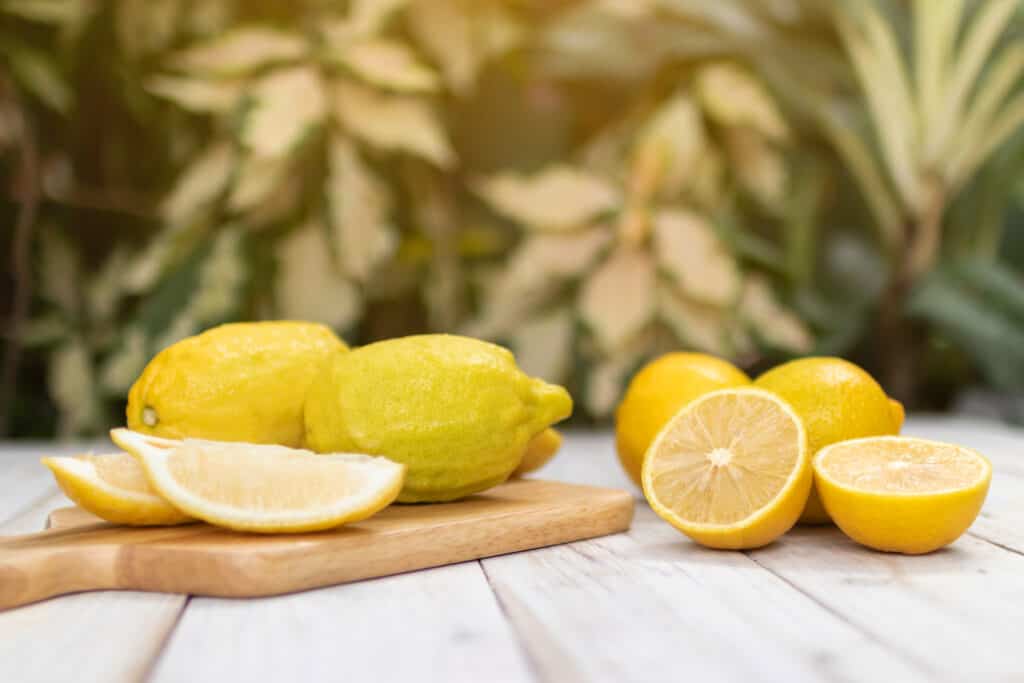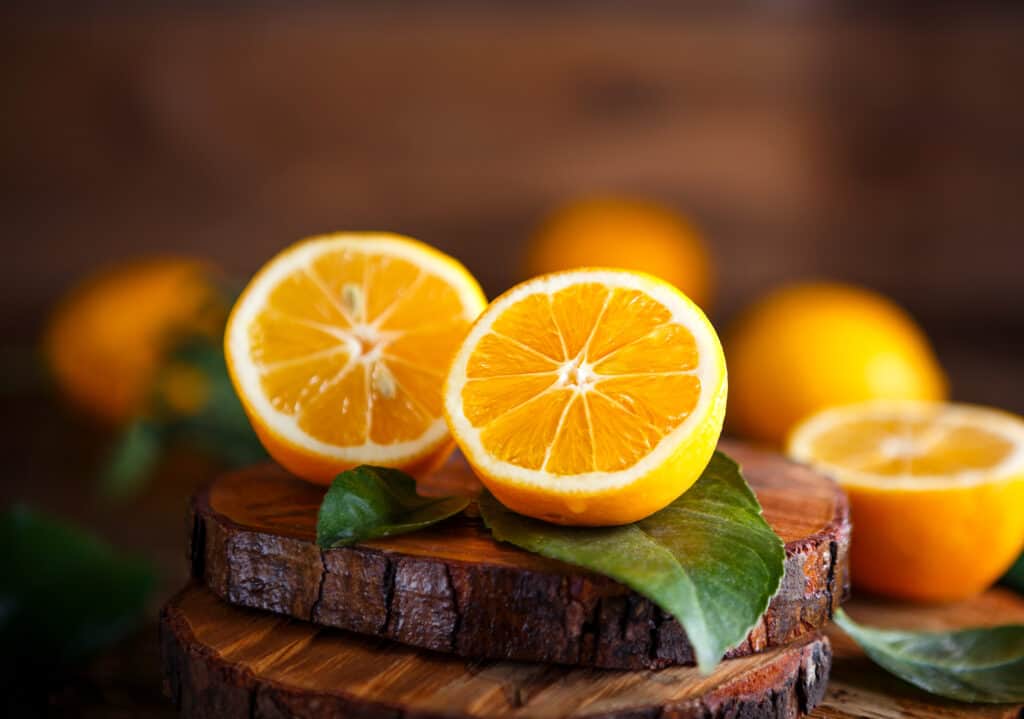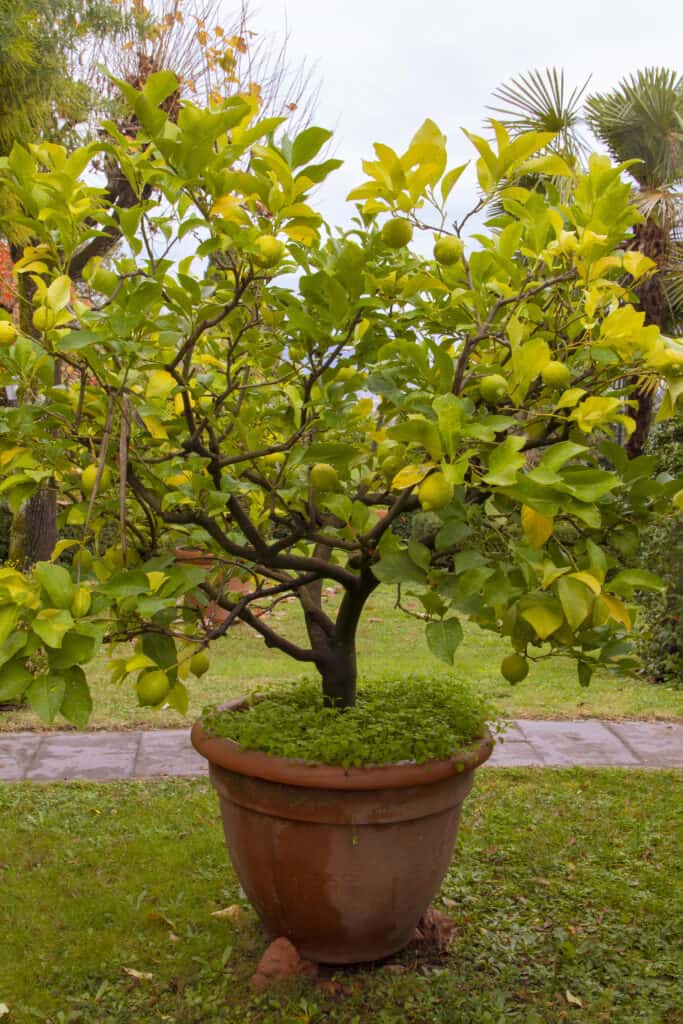If you live in a warm, sunny area, you may have seen Lisbon lemon trees or Meyer lemon trees growing in your neighbor’s yard, or perhaps you’re even growing your own. Lemon trees are an easy way to add color to a patio as they grow or in large pots. In humid, subtropical climates. Lemons are a staple of a well-stocked kitchen. Many recipes call for a squeeze of lemon juice, a slice for garnish, or the addition lemon zest, especially in baking,
With so many varieties available, it can be difficult to decide which lemon tree is best for you. The Lisbon lemon and the Meyer lemon are two popular varieties that produce abundant fruit and are easy to grow.
Let’s take a quick look at their similarities and the differences:
| Lisbon Lemon Tree | Meyer Lemon Tree | |
|---|---|---|
| Plant Classification | Citrus x limon ‘Lisbon’, Rutaceae | Citrus x meyeri, Rutaceae |
| Description | The Lisbon lemon tree is a thorny evergreen ripping out more than at 13 feet. This hardy, plant can tolerate fluctuations in climate and has multiple high yield harvests each year, making it the perfect cultivar for citrus farmers and commercial operations. | The Meyer lemon tree is naturally shrub-like but can achieve true tree shape with careful pruning. Leaves are dark green and shiny; the trunk is smooth and slender; little white flowers are fragrant and beautiful. |
| Uses | Lisbon lemon trees are farmed for their bright, slightly tart fruit. Lisbon lemons are perfect for baking, cooking, enhancing drinks, and adding a splash of freshness and color to cocktails. | Originally cultivated for ornamental and decorative reasons, the Meyer lemon has grown in popularity due to its sweeter taste. It is self-pollinating, meaning only one plant is required to produce a fruitful harvest of fresh citrus. |
| Origin | The Lisbon Lemon was derived from the Gallego lemon, native to Portugal. The fruit of the Lisbon lemon is now a standard product found in supermarkets across the world. | The Meyer Lemon is native to China. This hybrid tree is a cross between a citron and a mandarin/pomelo, |
Key Differences Between Lisbon Lemon and Meyer Lemon
Both Lisbon lemon trees and Meyer lemon trees are smaller varieties, highly productive, and uniquely ornamental however, some of the characteristics that distinguish the Lisbon lemon from the Meyer are:
- Size: Mature Meyer lemon trees can grow to 10 feet tall, making them ideal for container gardening, although Lisbon lemon trees may reach 13 feet at full maturity, an ideal size for hand harvesting and cultivating in mid-sized orchards.
- Fruit: Lisbon lemon trees produce the classic oblong-shaped lemon: a thick yellow peel, bulbous fruit body, and node-like protuberances at both ends. Meyer lemons are smaller, smoother, rounder, and more ball-shaped by comparison.
- Growing: The fruit of a Lisbon lemon tree grows inside the canopy, protecting it from wind and adverse weather conditions. This ensures a healthy fecund harvest which commercial growers depend on. Meyer lemon may require pruning to create the same protective environment for new fruit, to develop the single trunk, and to avoid overcrowding on the plant.
Fruit Description of Lisbon and Meyer Lemons
Lisbon lemons are round and heavy, with a protruding point called the mammilla; the rind is pitted with oil glands. Under the thick peel lies a layer of the white pith. Lisbon lemons is have 10 or 12 sections with a few cream-colored seeds present. The fruit can be seedless. Lisbon lemons are fruit is tart, tangy and sour.

The fruit of the Lisbon lemon is classically shaped, round, and heavy. The pronounced protruding point at one end is known as the mammilla.
©iStock.com/PJjaruwan
Meyer lemon trees produce smaller fruit that is rounder than a Lisbon lemon, with a thinner, smoother rind, and a distinct orange tint. Their flesh is softer, sweeter, and less acidic than the varieties found in the supermarket. Meyer lemons combine the Lisbon lemon’s tartness with the mandarin orange’s sweetness. The pulp is darker, more orangey, and contains many seeds, up to 10 per fruit.

The rind of the Meyer lemon has a distinct orange tint.
©iStock.com/LindasPhotography
The Lisbon lemon produces fruit with more juice than other varieties is cultivated specifically for this purpose.
Uses of Lisbon and Meyer Lemons
The medium to large Lisbon lemon averages 5-8cm (2-2.5 inches) and is tough enough to withstand transport to reach the supermarket shelves unblemished. Lemons are versatile little fruits with many uses, from salad dressing or to meat tenderizer. Combining Lisbon lemon juice with a touch of honey, soothes a sore throat. Applying lemon juice to insect bites or rashes will prevent or reduce itchiness, and around the house, lemon juice is a dandy, fresh-scented antiseptic cleaner.
Conversely, Meyer lemons are highly ornamental and often cultivated purely for decorative purposes. The round yellow fruit looks impressive, and the plant thrives in larger patio pots. The Meyer has enjoyed a resurgence in popularity as an ingredient, due to its fresh orangey taste and natural sweetness.
Growing Conditions for Lisbon and Meyer Lemon Trees
Lisbon lemons prefer shelter locations in full sunlight. Plant the tree in spring or fall for the best results. Water regularly, especially in the first year, as roots develop and spread. Mulch surrounding soil with compost to prevent water loss. These ever-bearing citrus trees require a healthy supply of nutrients to achieve maximum yield. Fertilize two times a year with a specific citrus mix, first in spring and again in late August.
Meyer lemons enjoy similar growing conditions in ground soil. Choose a large, well-draining pot and citrus-specific potting soil composed of sand, silt, and clay for patio pots. Position the plant in full sunlight and water frequently and protect it from frost by relocating indoors if possible. Meyer lemon trees may be small, but soon the branches will be heaving with delicious fruit to enjoy!

Choose a large, well-draining pot and citrus-specific potting soil when potting your lemon tree.
©iStock.com/galina ermolaeva
Nutritional Information for Lisbon and Meyer Lemons
Lisbon and Meyer lemons are both packed full of powerful nutrients.
Lemons are loaded with potassium, magnesium, and vitamin C, an antioxidant that boosts the immune system and reduces inflammation. Lemon stimulates collagen production in the skin, making it a valuable ingredient in pharmaceuticals and skincare. Lemons are also important in weight loss programs and detox recipes. Lemons also contain calcium which promotes strong teeth and healthy gums, a fact ancient seafarers and explorers understood. Therefore, they packed the trusty yellow citrus alongside oranges and limes on long voyages to avoid scurvy and other disease caused by nutrient deficiencies.
Facts About Lisbon and Meyer Lemons
Newer, disease-resistant cultivars of the Meyer lemon tree are also naturally insect-repellent, making them an excellent choice for an indoor citrus plant.
Prior to the prolific cultivation of the Lisbon lemon in California, most citrus consumed in the US was imported from Sicily.
Meyer lemon trees can live and produce bumper crops for up to 50 years, given optimum conditions.
In commercial operations, lemons are often waxed prior to shipping. Applying a thin coat of shellac or olive oil wax protects against damage caused in transit, extending the shelf life of the fruit and maximizing the profit for the grower.
Meyer lemons grown outdoors play host to numerous insects, including the Giant Swallowtail, the largest butterfly in North America.
Overview
There is huge variety to be found in lemon trees and their fruit. From the plant’s size, shape, and productivity to the unusual shiny leaves and showy flowers, each variety bears its unique characteristics. If you are looking for the perfect ornamental patio plant to grow at home or the correct fruit to compliment your recipe, there is a lemon tree for you.
So, next time life hands you lemons, first discover which variety they are, and then uncover the many ways to enjoy the unique signature citrusy taste!
Please note: Like many citruses, the Meyer and Lisbon lemon trees’ fruit, skin, and plant components are toxic to cats and dogs. Signs of poisoning include vomiting, clumsiness, and prolonged depression.
Up Next:
- Can Lemon Trees Grow in Texas?
- Can Dogs Eat Lemons or Not? What Science Says
- What Texas Fruits Are in Season Throughout the Year?
The photo featured at the top of this post is © iStock.com/Denira777
Sources
- fast-growing-trees (1970) Lemon Trees 101: Types and How to Care for Them – FastGrowingTrees.com (fast-growing-trees.com)
- thatsitfruit (1970) Lemon Facts: 10 Interesting Insights on the Citrus Fruit (thatsitfruit.com)
- specialityproduce (1970) Lisbon Lemons Information, Recipes and Facts (specialtyproduce.com)
- thespruce (1970) Meyer Lemon Tree Care & Growing Guide (thespruce.com)
- this old house (1970) Everything You Need to Know About Meyer Lemon Trees (thisoldhouse.com)
- house grail (1970) 15 Types of Lemon Trees (With Pictures) | House Grail
Thank you for reading! Have some feedback for us? Contact the AZ Animals editorial team.







